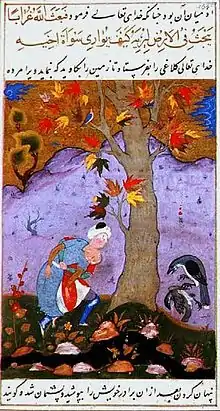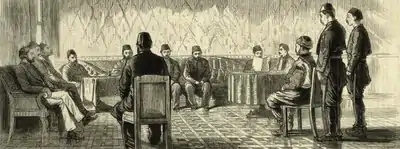Al-Ma'idah
Al-Ma'idah (Arabic: ٱلمائدة, Al-Māʾidah; meaning: "The Table" or "The Table Spread with Food") is the fifth chapter (sūrah) of the Quran, with 120 verses (āyāt). Regarding the timing and contextual background of the supposed revelation (asbāb al-nuzūl), it is a "Medinan surah", which means it is believed to have been revealed in Medina, instead of Mecca.
| المائدة Al-Māʼidah The Table Spread with Food | |
|---|---|
| Classification | Medinan |
| Other names | The Feast |
| Position | Juzʼ 6 to 7 |
| Hizb no. | 11 to 13 |
| No. of Rukus | 16 |
| No. of verses | 120 |
| No. of Sajdahs | none |
| Quran |
|---|
 |
|
The chapter's topics include animals which are forbidden, Jesus' and Moses' missions. Verse 90 prohibits "The intoxicant" (alcohol). Verse 8 Contains the passage: "Do not let the hatred of a people lead you to injustice".[1] Verse 67 is relevant to the Farewell Pilgrimage and Ghadir Khumm.[Quran 5:67]
Verses (Q5:32-33) have been quoted to denounce killing, by using an abbreviated form such as, "If anyone slays a person, it would be as if he slew the whole people: and if anyone saved a life, it would be as if he saved the life of the whole people". This verse is similar to that of one from the Talmud.[Quran 5:32][Quran 5:33] The use of this abbreviated rephrasing has been criticised as misleading by Andrew Bostom inter alia.[2][3][4]
Summary


- 1 Covenants are to be fulfilled
- 2 Lawful meats
- 3 Heathen pilgrims not to be molested
- 4 Islam completed—last revelation of the Quran
- 4-5 Certain kinds of food, gaming, and lots forbidden
- 6 Muslims permitted to eat the food of Jews and Christians, and to marry their women
- 7 The law of purifications
- 8 Believers reminded of the covenant of Aqabah
- 9-11 Muslims should forget old quarrels with brethren
- 12 God’s favour to Muslims
- 13-15 Disobedience of Jews and Christians exposed
- 16-18 Jews and Christians are exhorted to accept Islam
- 19-20 The divinity of Christ denied
- 21 Jews and Christians not the children of God
- 22 Muhammad sent as a warner
- 23-29 Israel’s rebellion at Kadesh Barnea
- 30-34 The story of Cain and Abel 35-36 The sin of homicide
- 37-38 The punishment of theft accompanied by apostasy
- 39 The faithful exhorted to fight for religion
- 40-41 The punishment of infidels
- 42-44 The penalty of theft
- 45-55 Muhammad to judge the Jews and Christians by the law, gospel, and the Quran
- 56 Muslims forbidden to fraternise with Jews and Christians
- 57-58 Hypocrites threatened
- 59-61 Believers warned and instructed
- 62-63 Muslims not to associate with infidels
- 64-65 The Jews exhorted and warned
- 66-69 The hypocrisy and unbelief of the Jews rebuked
- 70 Promises to believing Jews and Christians
- 71 Muhammad required to preach 72 He attests Jewish and Christian Scriptures 73 Believing Jews, Sabeans, and Christians to be saved
- 74-75 The Jews rejected and killed the prophets of God 76-81 The doctrines of the Trinity and Christ’s Sonship rejected 82-84 Disobedient Jews cursed by their prophets 85-88 Jewish hatred and Christian friendship compared
- 89-90 Muslims to use lawful food etc
- 91 Expiation for perjury
- 92-94 Wine and lots forbidden
- 95-97 Law concerning hunting and gaming during pilgrimage
- 98-100 Pilgrimage and its rites enjoined
- 101-102 The Prophet not to be pestered with questions
- 102-104 Heathen Arab customs denounced
- 105-107 Wills to be attested by witnesses
- 108 The prophets ignorant of the characters of their followers
- 109-110 Jesus—his miracles—God’s favour to him
- 111 The apostles of Jesus were Muslims
- 112-114 A table provided by Jesus for the apostles
- 115-118 Jesus did not teach his followers to worship him and his mother
- 119 The reward of the true believer
- 120 God is sovereign [5]
Exegesis
3 Verse of Ikmal al-Din
This verse has a Parenthetical Sentence: "This day have those who disbelieve despaired of your religion, so fear them not, and fear Me. This day have I perfected for you your religion and completed My favor on you and chosen for you Islam as a religion.."[Quran 5:3] This verse was revealed at Arafat as reported in the authentic hadith:
Narrated 'Umar bin Al-Khattab: Once a Jew said to me, "O the chief of believers! There is a verse in your Holy Book which is read by all of you (Muslims), and had it been revealed to us, we would have taken that day (on which it was revealed) as a day of celebration." 'Umar bin Al-Khattab asked, "Which is that verse?" The Jew replied, "This day I have perfected your religion for you, completed My favor upon you, and have chosen for you Islam as your religion." (5:3) 'Umar replied,"No doubt, we know when and where this verse was revealed to the Prophet. It was Friday and the Prophet was standing at 'Arafat (i.e. the Day of Hajj).
— Bukhari
27-31 Cain and Abel
The story appears in the Quran 5:27-31:[6]

Relate unto them also the history of the two sons of Adam, with truth. When they offered their offering, and it was accepted from one of them, and was not accepted from the other, Cain said to his brother, I will certainly kill thee. Abel answered, GOD only accepteth the offering of the pious
— The Quran, translated by George Sale
If you raise your hand to kill me, I will not raise mine to kill you. I fear God, the Lord of all worlds, and I would rather you were burdened with my sins as well as yours and became an inhabitant of the Fire: such is the evildoers' reward.' But his soul prompted him to kill his brother: he killed him and became one of the losers. God sent a raven to scratch up the ground and show him how to cover his brother's corpse and he said, 'Woe is me! Could I not have been like this raven and covered up my brother's body?' He became remorseful.
— The Quran, translated by Muhammad Abdel-Haleem
33 Hirabah verse
This verse from Qur'anic chapter al-ma'idah (Q5:33) is known as the Hirabah verse (ayat al-hiraba),[7] It specifies punishment for "those who wage war against God and His Messenger and strive to spread disorder in the land":[8] The verbal noun form (i.e. ḥirabah) is frequently used in classical and modern books of Islamic jurisprudence, but neither the word ḥirabah nor the root verb ḥaraba occurs in the Quran.[9] (Yuḥāribūna is the form used in Quran 5:33-4.)
According to early Islamic sources, the verse was revealed after some members of the Urayna tribe feigned conversion to Islam in order to steal Muslims' possessions and killed a young shepherd sent to teach them about the faith. In view of the broad and strong language of the verse, however, various state representatives beginning with the Umayyads have asserted that it applied to rebels in general.[10]
The original meanings of the triliteral root ḥrb are to despoil someones wealth or property, and also fighting or committing sinful act. The Quran "refers to both meanings" in verses 2:279 and 5:33-34.[11]
51 Do not take Jews and Christians as allies
The Quran, chapter 5 (Al-Ma'ida), verse 51:[12]
— translated by Sahih International
Some Muslim hard liners have used verses such as this one to denounce close relationships with non-Muslims and forbidding non-Muslims from becoming leaders in Muslim countries.[13] However, other Muslim scholars such as Shafi Usmani see this as forbidding only "indiscriminating intimacy" which might confuse the "distinctive hallmarks of Islam", while all other equitable relations as being allowed.[14] Ghamidi in the context of his Itmam al-Hujjah interpretation of Islam, restricts the subjects of this verse to only the Jews and Christians of the Muslim Prophet's time.[15] Others argue that only belligerent non-Muslims are being referenced here.[16] Verse 51 is preserved in the Ṣan‘ā’1 lower text.[17]
Verse 54
- O true believers, whoever of you apostatizeth from his religion, GOD will certainly bring other people to supply his place, whom he will love, and who will love him; who shall be humble towards the believers; but severe to the unbelievers: they shall fight for the religion of GOD, and shall not fear the obloquy of the detractor. This is the bounty of GOD, he bestoweth it on whom he pleaseth: GOD is extensive and wise.[18]
Verse 54 is also interesting in relation to who the "beloved" are; some hadith view it as being Abu Musa al-Ashari.[19][Quran 5:54] Verse 54 is preserved in the Ṣan‘ā’1 lower text.[20]
Shia' view
On the Shia interpretation of this verse, God used the singular form "waliyyukum" implying the "wilayah" (Guardianship of the believers) is a single project. In other words, the "wilayah" of the messenger and that of the Ali springs from the root of God's wilayah. The word "wali" in the context of this verse cannot mean "friend" because there is not a single verse in the Quran where God says that any one of his messengers is a friend or helper of their followers. Further if the verse implied "wilayah" in the sense of friend or helper, then the singular form "waliyyukum" would not have been used but the plural form "awliya'ukum" would be appropriate because the "friendship" of God is unique.
Tahir ul Qadri writes regarding this verse:[21] A hadith attributed to Ammar bin Yasir reports:
Sunnis tend to view this with differing views.
Shi'as tend to view this as Sahih.
Verses 72 and 73
The Quran: An Encyclopedia says, "The Quran’s objection to Christian practice is Christianity’s shirk, its worship of Jesus, Mary and the saints ‘in derogation of Allah’. There is no justification in believing in the Trinity, for Jesus never would have condoned such a concept".[22] In Sahih International: "(72) They have certainly disbelieved who say, " Allah is the Messiah, the son of Mary" while the Messiah has said, "O Children of Israel, worship Allah, my Lord and your Lord." Indeed, he who associates others with Allah - Allah has forbidden him Paradise, and his refuge is the Fire And there are not for the wrongdoers any helpers. (73) They have certainly disbelieved who say, Allah is the third of three. And there is no god except one God. And if they do not desist from what they are saying, there will surely afflict the disbelievers among them a painful punishment."[23][Quran 5:72–73]
Verse 90
In Verse 90 it says, "O you who have believed, indeed, intoxicants, gambling, [sacrificing on] stone altars [to other than Allah], and divining arrows are but defilement from the work of Satan, so avoid it that you may be successful." This is a clear ruling in The Quran for Muslims to avoid alcohol and gambling.[24]
See also
References
- Dr. Mustafa Khattab, the Clear Quran
- Andrijasevic, Mladen (4 July 2009). "Obama quotes verse 5:32, omits 5:33". American Thinker. Retrieved 5 May 2016.
- Amuhd (7 July 2015). "Whoever kills a person (unjustly) …it is as though he has killed all mankind.….Quran 5:32". Telegraph. Archived from the original on 8 March 2016. Retrieved 5 May 2016.
- Zaimov, Stoyan (24 August 2016). "Muslim-Americans Condemn ISIS in Phoenix Billboard, Say Islam Is Religion of Peace, Not Terror". Christian Post. Retrieved 9 October 2016.
- Wherry, Elwood Morris (1896). A Complete Index to Sale's Text, Preliminary Discourse, and Notes. London: Kegan Paul, Trench, Trubner, and Co.
 This article incorporates text from this source, which is in the public domain.
This article incorporates text from this source, which is in the public domain. - Abel. "Abel - Ontology of Quranic Concepts from the Quranic Arabic Corpus". Corpus.quran.com. Retrieved 2015-12-17.
- El Fadl, Khaled Abou (2006). "Rebellion". In Jane Dammen McAuliffe (ed.). Encyclopaedia of the Qurʾān. 4. Brill. p. 364.
Q 5:33 [...] The verse (known as āyat al-hirāba)
- Javed Ahmad Ghamidi, Mizan, The Penal Law of Islam, Al-Mawrid Archived 2007-01-27 at the Wayback Machine
- Amin, ElSayed (2014). Reclaiming Jihad: A Qur'anic Critique of Terrorism. Kube Publishing. p. 133. ISBN 9780860375982. Retrieved 9 November 2015.
Neither the word hirabah nor the triliteral root verb haraba occurs in the Quran, although the verbal noun form (i.e. hirabah) is frequently used in classical and modern books of Islamic jurisprudence.
- El Fadl, Khaled Abou (2006). "Rebellion". In Jane Dammen McAuliffe (ed.). Encyclopaedia of the Qurʾān. 4. Brill. p. 364.
- Amin, ElSayed (2014). Reclaiming Jihad: A Qur'anic Critique of Terrorism. Kube Publishing. pp. 132–3. ISBN 9780860375982. Retrieved 9 November 2015.
- The Qur'an. Center for Muslim–Jewish Engagement, University of Southern California. 2008. Archived from the original on 18 June 2017.
- McBeth, John (8 November 2016). "Blasphemy probe rocks Indonesia's secular foundations". The National. Retrieved 18 November 2016.
- Shafi, Muhammad. Ma'ariful Qur'an. p. 187.
Muslims can deal with non-Muslims in the spirit of tolerance, sympathy, goodwill, equity, justice, favour and kindness, almost every-thing within that line of conduct. In fact, they should do that for they have been taught to do that. But, what is not permitted is the kind of fast friendship and indiscriminating intimacy which may garble the distinctive hallmarks of Islam. This is the issue known as the 'Tark al-Muwālāt' to refrain from deep (friendship) in Islamic terminology.
- Ghamidi, Javed Ahmed. Al-Bayan.
- "Surah 5:51, 3:28, 4:144 Explained". Discover The Truth. 2017-01-23. Retrieved 2020-06-05.
- Behnam Sadeghi & Mohsen Goudarzi, "Sana'a and the Origins of the Qu'ran", Der Islam, 87 (2012), 37.
- George Sale translation
- Ahadith In Praise Of The Ash`Aris
- Behnam Sadeghi & Mohsen Goudarzi, "Sana'a and the Origins of the Qu'ran", Der Islam, 87 (2012), 37.
- The Ghadir Declaration, By Dr. Tahir al-Qadiri, Page 48 & 49 Archived 2006-10-20 at the Wayback Machine
- Leaman, Oliver, ed. (2006). "The Qur'an: an Encyclopedia" (PDF). Routledge. pp. 144–145. ISBN 0-415-32639-7. Retrieved 22 November 2014.
- Sahih International
- "Surah Maidah Transliteration". My Islam. April 19, 2019. Retrieved April 19, 2019.
External links
 Works related to The Holy Qur'an (Maulana Muhammad Ali)/5. The Food at Wikisource
Works related to The Holy Qur'an (Maulana Muhammad Ali)/5. The Food at Wikisource- Quran 5 Clear Quran translation